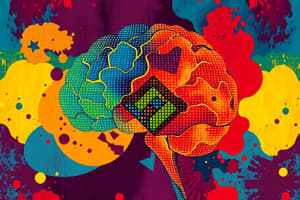Podcast
Questions and Answers
What is the role of a knowledge base (KB) in reasoning?
What is the role of a knowledge base (KB) in reasoning?
- It stores all possible outcomes of reasoning.
- It is the starting point for all reasoning. (correct)
- It simplifies the representation of natural languages.
- It directly manipulates symbol structures.
Which of the following best describes how knowledge can be represented in traditional AI?
Which of the following best describes how knowledge can be represented in traditional AI?
- As simple mathematical equations.
- As symbol structures. (correct)
- As random data points.
- As natural language sentences.
Why are natural languages not considered a suitable option for expressing symbol structures in AI?
Why are natural languages not considered a suitable option for expressing symbol structures in AI?
- They promote ambiguity and make inference difficult. (correct)
- They are not scalable for large data sets.
- They require extensive programming knowledge.
- They are too simplistic to represent complex knowledge.
What limitation do programming languages have in representing knowledge for AI?
What limitation do programming languages have in representing knowledge for AI?
Which of the following is a potential advantage of using formalism for knowledge representation in AI?
Which of the following is a potential advantage of using formalism for knowledge representation in AI?
What does a priori knowledge refer to?
What does a priori knowledge refer to?
How is procedural knowledge best described?
How is procedural knowledge best described?
In a minesweeper world, how can you express the knowledge that the initial cell has no bomb?
In a minesweeper world, how can you express the knowledge that the initial cell has no bomb?
What type of knowledge can be treated as rules in the minesweeper game?
What type of knowledge can be treated as rules in the minesweeper game?
How can a player express the knowledge that there are no mines in the vicinity of the starting field?
How can a player express the knowledge that there are no mines in the vicinity of the starting field?
What does inferential adequacy refer to?
What does inferential adequacy refer to?
Which statement best describes a consistent knowledge representation (KR) system?
Which statement best describes a consistent knowledge representation (KR) system?
What defines the semantics of a propositional symbol in propositional logic?
What defines the semantics of a propositional symbol in propositional logic?
In which logic type are statements composed of simple propositions that can be true or false?
In which logic type are statements composed of simple propositions that can be true or false?
What is a primary disadvantage of representing complex knowledge as natural language strings?
What is a primary disadvantage of representing complex knowledge as natural language strings?
What is the role of syntax in a formal language like logic?
What is the role of syntax in a formal language like logic?
Which of the following represents an efficient knowledge representation for reasoning?
Which of the following represents an efficient knowledge representation for reasoning?
Which type of logic is characterized by its ability to characterize concepts in time?
Which type of logic is characterized by its ability to characterize concepts in time?
What can be concluded if the premise in the implication P => Q is false?
What can be concluded if the premise in the implication P => Q is false?
What does modus ponens allow you to conclude?
What does modus ponens allow you to conclude?
Which of the following is NOT a valid part of a well-formed formula?
Which of the following is NOT a valid part of a well-formed formula?
Which logic is recommended for expressing general statements involving quantifiers?
Which logic is recommended for expressing general statements involving quantifiers?
What is the first step in creating a sentence based on the recursive definitions mentioned?
What is the first step in creating a sentence based on the recursive definitions mentioned?
If a certain proposition p is true and q is false, what can be said about the implication p => q?
If a certain proposition p is true and q is false, what can be said about the implication p => q?
Which of the following statements about the use of logical connectives is true?
Which of the following statements about the use of logical connectives is true?
What does the subject in a predicate typically represent?
What does the subject in a predicate typically represent?
What is a key feature that a knowledge representation (KR) language should have to enhance expressiveness?
What is a key feature that a knowledge representation (KR) language should have to enhance expressiveness?
Which function of syntax in a knowledge representation language is exemplified by the expression 'red1(car1)'?
Which function of syntax in a knowledge representation language is exemplified by the expression 'red1(car1)'?
What aspect of knowledge representation is crucial for transforming facts into conclusions?
What aspect of knowledge representation is crucial for transforming facts into conclusions?
How does the semantic meaning of an expression like 'Pred(Arg)' function in knowledge representation?
How does the semantic meaning of an expression like 'Pred(Arg)' function in knowledge representation?
Why might natural language strings be inadequate for knowledge representation?
Why might natural language strings be inadequate for knowledge representation?
What is an inherent trade-off in selecting a knowledge representation language?
What is an inherent trade-off in selecting a knowledge representation language?
What does representational adequacy ensure in a knowledge representation language?
What does representational adequacy ensure in a knowledge representation language?
What role does inferential efficiency play in knowledge representation?
What role does inferential efficiency play in knowledge representation?
Flashcards are hidden until you start studying
Study Notes
Knowledge Representation
- Knowledge representation (KR) is the way we represent knowledge in a way that can be used by a computer.
- A priori knowledge is knowledge that is known before any experience, and is considered to be universally true.
- A posteriori knowledge is knowledge that is learned through experience and can be verified through the senses.
- Procedural knowledge is knowledge of how to do something.
- Declarative knowledge is knowledge of what is true or false.
Mine Sweeper Example
- In the Minesweeper game, the goal is to find a path from the start to the exit field on a board with hidden mines.
- A device can detect the number of mines in neighboring fields, but not the exact location.
- Knowledge in the Minesweeper game can be represented using binary variables (0/1) to denote the presence or absence of a mine in a specific cell.
- For example, B13 = 0 indicates there is no mine in cell 13.
Knowledge Base
- To safely navigate the Minesweeper board, we need facts and rules about the game.
- A "knowledge base (KB)" is an internal representation of facts and rules that serves as the starting point for reasoning.
- A language is needed to express facts and rules in the KB.
Symbol Structures
- In traditional AI, it is assumed that knowledge can be represented as symbol structures.
- These symbol structures include complex data structures that represent objects, concepts, facts, rules, and strategies.
- For example, "red" could represent the color red, "car1" could represent a specific car, and "red(car1)" could represent the fact that the car is red.
Language Possibilities for KR
- Three possible language choices for KR:
- Natural languages: Expressive but ambiguous, making inference difficult.
- Programming languages: Precise but lack expressiveness, not suitable for representing all types of knowledge.
- Formalisms: Balance expressiveness and precision, such as logic.
Ideal Properties of a Knowledge Representation Language
- An ideal KR language should have:
- Representational adequacy/expressiveness
- Clear syntax and semantics
- Inferential adequacy
- Inferential efficiency
- Naturalness
- Consistency
Representing Facts
- Facts can be represented using natural language strings, but this makes manipulation and conclusion drawing difficult for machines.
- Some notations/languages are limited in representing certain aspects like time, beliefs, and uncertainty.
KR Language Syntax and Semantics
- KR languages need precise syntax and semantics to define the meaning of expressions.
- Syntax specifies which combinations of symbols are valid expressions in the language.
- Semantics defines the meaning of expressions in terms of objects in the real world.
Naturalness and Inferential Adequacy
- A KR scheme should be intuitive and "natural" for human readers to understand.
- Inferential adequacy refers to how easy it is to draw new conclusions from existing facts using the represented knowledge.
- Natural language strings have good representational adequacy and naturalness, but poor inferential adequacy.
- Representing everything using natural language strings may lead to inefficiencies in complex deductions.
Inferential Efficiency and Consistency
- A KR system should be efficient enough to perform complex deductions without becoming hopelessly inefficient.
- A consistent KR system avoids redundant information and conflicting information.
Logic in KR: Propositional Logic
- Logic provides a formal language with precise syntax and semantics, and supports sound inference.
- Propositional logic is a simple language that deals with propositions, which are statements that have a truth value (true or false).
- Propositional symbols are used to represent propositions, and their semantics define their meaning.
- Logical connectives like "and" (), "or" (), "implies" (), and "if and only if" (↔) are used to combine propositions.
Implication (=>) in Propositional Logic
- P=>Q means "if P is true, then I am claiming that Q is true, otherwise no claim."
- The implication is only false when P is true and Q is false.
Inference Rules in Propositional Logic
- Inference rules are used to derive new conclusions (true statements) from existing knowledge (true premises).
- One example is Modus Ponens: "If A is true and A B is true, then conclude that B is true."
Limitations of Propositional Logic
- Propositional logic cannot represent general statements that include quantifiers (such as "all" or "some").
- It lacks expressiveness for representing quantification, which is common in knowledge and reasoning processes.
Predicate Logic
- Predicate logic is a more expressive logic that can represent quantification.
- It introduces predicates, which are functions that return a truth value (true or false) based on their arguments.
- Quantifiers like "for all" (∀) and "there exists" (∃) allow us to express general statements about objects.
Studying That Suits You
Use AI to generate personalized quizzes and flashcards to suit your learning preferences.




